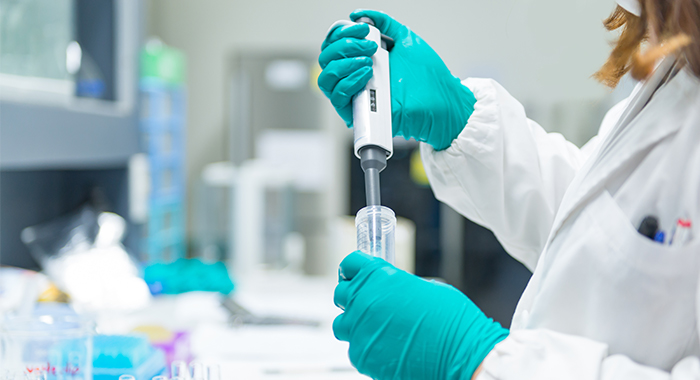Global Manufacturer Builds Research Partnership With SNC
A global private-label manufacturer of consumer wet wipes needed to conduct a quality assessment of a new supplier – something it couldn’t do in-house. So the manufacturer struck a partnership with St. Norbert College.
Rockline Industries of Sheboygan, Wis., switched to a new supplier of antibacterial surfactant (a detergent or wetting agent). “It’s a very special multifunctional surfactant that we use in our personal care wet wipes – such as baby wipes, toilet tissues and facial wipes,” says Doug Cole, vice president of global product development at Rockline. “We sell to Target, Walmart, Walgreens. The two chemical surfactants were the same from two different suppliers. We wanted to determine if they are chemically different.
“In particular, we wanted to know which portion of that molecule actually did the preservative action,” he adds. “Which part of the molecule actually killed the bacteria?”
So last summer, Cole presented an exploratory project to the college, meeting with Amy Kundinger (College Advancement), Jon Russel (Chemistry) and David Hunnicutt (Biology). Bailey Hanson ’20 and Sarah Rolfs ’20 took on the project as part of a summer research initiative. Rockline made a gift to the college, which covered stipends that were paid to the students.
Hanson broke down the surfactants to compare the chemical structures, and Rolfs executed the microbiology half of the project, “taking the surfactants Bailey had analyzed in the chemistry lab and testing them against a number of clinically relevant bacteria to measure the effectiveness of their antibacterial properties,” she says.
Russel says St. Norbert was well positioned to expand the project.
“Even when you have the material you are using as the surfactant, there is other gunk in there,” he explains. “Something we are able to do that they don’t do at Rockline is separating out some of the impurities to see if we could find out if there are other specific ways they differ. You can also do antibacterial testing on impurities, to see if any of the antibacterial activity is related to anything other than the surfactant.”
The research showed that the antibacterial activity is tied to the surfactant and not the impurities. Hanson and Rolfs presented their information to the senior leadership team at Rockline. Hanson and Rolfs pinpointed which portion of the surfactant killed the bacteria.
“We use that information for millions of packages of flushable wipes and facial wipes,” Cole says. “We can remove one of the other preservatives that we didn’t need, therefore making our product with less ingredients and safer.”
“They did an outstanding job,” Cole says of Rolfs and Hanson. “I went to college to study chemistry and I was not at that level. The quality of the work and the way they conveyed the information was so valuable to Rockline. We showed them some of the products that their work is going into. Being a laboratory person, your work is so influential into the bigger picture. Anytime you see a product in the store, somebody had to put that together.”
While the project provided a service to Rockline, Russel appreciates the continuous learning opportunity as a synthetic chemist.
“In industry they don’t have time for messing around, but I’m an academic,” he says with a laugh. “Our job is to create new knowledge. It can happen really slowly, but what we like to be able to do is to go back and play with that system.”
Projects like Rockline’s give students valuable opportunities, he says. “We always have students doing projects. For chemistry, they take independent research as an elective, so we need projects.”
Rolfs says, “It was my first time diving into research outside of a class setting. I was able to learn how to be independent in a lab while doing work that is applicable to everyday life for many people.”
Cole has another chemistry-related project for St. Norbert. It was intended for the summer, but, he says that Rockline is willing to start it up in the fall.
“We want to make these connections,” says Cole. “They benefit through learning. We benefit with the research and the link to students. The opportunity we want to open up is for the science graduates from St. Norbert to see that there are meaningful careers. We manufacture all over the world.”
June 24, 2020












